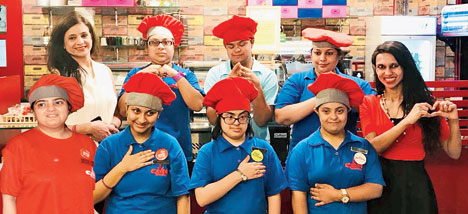
It's a weekday morning and a busy one for Ajai Kapur. Armed with a cup of coffee, he is doing some video editing work on his computer while making calls and preparing for a meeting scheduled later in the day.
Just a day in the life of another busy, busy urban professional? Pretty much, except that, unlike most of us, Ajai uses a motorised wheelchair to get around.
He had polio as a child. And it left its mark on his left leg.
The bad leg, however, has not impeded his life dreams. Ajai has built a company in Gurgaon that provides production and location services to overseas clients wanting to shoot films in India.
Tried and tested
Babli Das Gayen and husband Manas, are both teachers. Babli went to a blind school herself - the D.F. Blind School in Joka, Calcutta. According to her, with some help from the school principal, she landed a job in Dalkhola Girl's High School in Bengal's Uttar Dinajpur.
Now, Dalkhola High is no school for the blind. But Babli says she has never faced any problems in communicating with her students. "My students are very cooperative and pay a lot of attention to what I teach," she says.
While Babli teaches the junior school students, Manas teaches History at Sodepur Madodoy Institute of Higher Secondary, a Bengali-medium school in the North 24 Parganas. He says, "During BEd training, teachers are always told to teach without books. So I prepare the topic I have to teach and then speak on it in class extempore. Sometimes I make my students read out the chapter and explain it to them. I have two readers who help me with corrections. I walk about the class while teaching so that I can hear who is talking and who is not paying attention."
If there are hiccups, and there must be, he does not elaborate on those. And the sense one gets is that whatever professional challenge there might be is universal and nothing disability specific - at least not worth the mention.
Not only is being differently abled not the kind of career impediment it used to be some years ago, in fact, today, there are careers that intelligently harness the special abilities of this set.
For instance, people with visual impairment are in demand in the perfume industry - as 'noses'. Those who have sound communication skills, but might have motor impairments, can serve as telecallers and online customer service professionals.
Research has shown that professionals with disability have higher rates of retention and fewer occupational health and safety issues.

The Gift
According to the 2011 Census, six to seven per cent of India's 1.3 billion population is differently abled.
Studies by consultancy firms such as DuPont show that employees with disabilities on an average, register better attendance. A survey of 811 employees with disabilities found that 90 per cent rated average or better in job performance compared to 95 per cent for employees without disabilities.
And that is why, many companies are hiring them. About 60 per cent of the staff at the KFC outlet in New Market, Calcutta, are hearing and speech impaired.
"The hearing impaired can work well even in a noisy environment. They are also good at data entry, where they are faster and most accurate," says Samir Ray, founder of Silence, an NGO that promotes handicrafts made by a team of differently-abled people.
Café I Can Fly in the Ballygunje area of Calcutta is another example of an inclusive work environment. The cafe crew comprises people with Down Syndrome, intellectual disabilities, Attention Deficit Hyperactivity Disorder and autism.
Shuktara Cakes in Behala, which makes and sells authentic French baked goods, is another inclusive employer. "Our bakery products are made by young people with disabilities. Two of them have Cerebral Palsy and three of them are deaf and mute. They communicate through sign language and manage everything in the bakery," says manager Somnath Sardar.
As if to make a case in point, a restaurant in Hyderabad - Dialogue in the Dark - is trying something. The seating area has no lights. Guests are not allowed to carry anything that emits light and are guided by visually impaired staff. Moral of the meal: value each of the senses for what it is worth.
PACKAGE DEAL
Dependable: Independent research has shown that the differently-abled are more likely to keep the trust and live up to job expectations
Efficient: They are less distracted and more motivated. Also, they don’t job hop as much as their non-disabled counterparts. Their compassion quotient is also high, thus creating a favourable work environment
Sincere: In a supportive environment, a differently-abled employee is least likely to quit and most likely to meet tight deadlines
Less prone to absenteeism: A survey has revealed that the physically challenged take fewer leaves
Diversity: They bring to the job a unique point of view. If harnessed well this can translate into a wealth of workplace innovations











